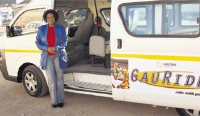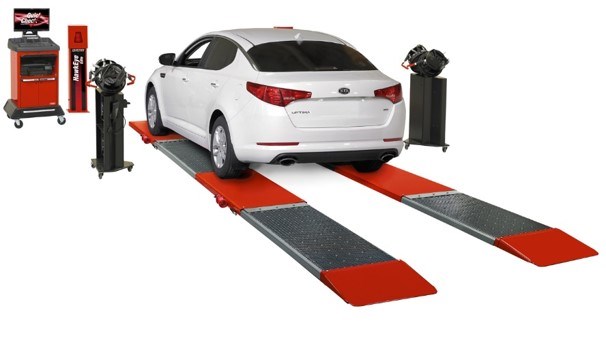Exposed: Deadly Taxi Racket
Special Investigation
# Owners unwittingly buy illegally converted panel vans that endanger thousands
# Car dealers, banks and licensing authorities blame each other for deathtrap fiasco
More than 4000 deathtrap taxis — some of which have already caused grisly deaths — have been let loose on South Africa’s roads by banks, car dealers and the Department of Transport.
The Sunday Times has established that about 4000 illegally converted Toyota Quantum panel vans have been operating as taxis, although they do not meet the government’s safety standards.
Seats are bolted onto the paper-thin steel floor instead of being fixed to the chassis, windows cut into the van weaken the structure and there is no rear roll bar. Roofs crumple on impact and seats rip loose, hurling passengers to their deaths, according to a notice sent to banks last year by private vehicle investigation firm International Vehicle Identification Desk (Ivid).
“Even in the smallest crash, passengers’ legs break like twigs,” said a department official who did not want to be named. “We have 4000 time bombs driving around, costing lives, and nobody is doing a thing about it.”
Some of these vehicles — many of which have been involved in serious accidents with high fatalities, including six children on one occasion — were even officially accredited to transport tourists during the recent Fifa Confederations Cup. And they could even be in use during the World Cup next year.
“We will continue to take the risk and work with these taxis, unless we’re physically forced to stop,” says Michael Yende of the Gauteng Taxi Council.
“We could have transported many tourists to the Confed games with these taxis. We just wouldn’t know,” said William Thembe, chairman of the Alexandra Taxi Association.
Now minister of transport Sbu Ndebele has vowed to make it a priority to pull these unsafe vehicles off the road.
Branding it a “concern”, Ndebele was alarmed that the vehicles had been used to ferry foreigners during the Confederations Cup. He said this must not be allowed to happen at next year’s tournament.
“We don’t want to hear of people dying in taxis getting to a match, particularly if we know those vehicles are not suitable.”
The illegally converted panel vans are estimated to ferry up to 400000 passengers a day across South Africa.
The country’s banks, the department, roadworthy agencies, Bureau of Standards and car dealers have been blaming each other for indifference, negligence or incompetence.
The Quantums were bought under the government’s taxi recapitalisation programme, which aimed to improve the safety of the 180000 taxis carrying 12 million people every day.
The banks, including Absa, Nedbank, Standard Bank and Wesbank, as well as vehicle industry credit provider SA Taxi Finance, have financed 973 converted Quantums used as taxis since August 2007, which is when regulations came into force designating these vehicles “illegal”, according to an analysis of the government’s vehicle database, eNatis.
The rest were either paid for in cash or financed by the banks before August 2007. eNatis confirmed there were more than 4000 of these converted Toyota Quantum panel vans operating as taxis on SA’s roads.
The banks have admitted to the Sunday Times that they had more than 700 of these vehicles on their books, at an estimated finance value of R140-million.
SA Taxi Finance said it had 584 on its books, Wesbank and Absa “less than 50”, Standard Bank 40, and Nedbank only three. Toyota Financial Services has not quantified its exposure.
Taxi owners were lured by dealers into buying Quantum Panel Vans from 2005 because they are up to R30000 cheaper and had more seats than the Toyota Quantum Sesfikile, the vehicle legally mandated to operate as a taxi.
The problem was flagged in a 2005 memo from Toyota, which said illegal conversions must not happen because it placed passengers at risk of “death or injury” and the company “in a situation where the client could sue us”.
Toyota last week launched another investigation into illegal conversions of panel vans after fresh allegations surfaced of dealers supplying vans for conversion, Toyota spokesman Ferdi de Vos confirmed this week.
Absa has now decided to treat every deal as fraudulent. “We will either go after the customer, the dealer or the person who converted that taxi,” said the bank’s head of vehicle finance, Marcel de Klerk.
But a letter sent in February 2008 by the department’s Kuben Pillay to the taxi financing committee, which included all the banks, suggests that banks will have to share liability. It says the government was alerted that banks were “financing vehicles that were not compliant to the September 2006 regulations”. It warns: “Financiers would be held accountable for financing non-compliant vehicles despite being aware of the requirements.”
Alarmingly, authorities have done little more than pass the buck. Though some vehicles have been pulled off the roads by police, there appears little concerted effort to do this.
Documents in the Sunday Times’s possession show the issue was repeatedly raised by the department’s vehicle technical committee, with the regulatory arm of the SABS coming under fire for failing to conduct regular inspection of companies licensed to modify vehicles, as they are required to do by law.
Roadworthy centres, which provided certificates of fitness to these vehicles, were also blamed.
Insiders in the department said illegal conversions had been on the committee’s agenda at every quarterly meeting for more than two years, including last week.
“Everybody is trying to blame everyone else,” said an official, who attended the meeting but did not want to be named.
“No one wants to take responsibility.”
Bafana Mkwebane, the deputy director-general of transport who chairs the committee, declined to confirm this. “No official will talk to the media about this,” he said.
Yende blamed the banks for the problem. “The banks require a taxi permit, so they knew they were financing taxis. We have fallen into a trap because the banks didn’t raise any objections to financing these vehicles. The banks just look to see if you are creditworthy. They just want sales,” he said.
James Chapman, who runs Santaco Trading — essentially the business arm of the SA National Taxi Council — agreed: “Banks may have been negligent to have allowed these vehicles to have ended up on their books.”
But SA Taxi Finance CEO Martin Bezuidenhout laid the blame squarely on the government. “We as financiers saw documents that were legitimate, and these vehicles were registered by the government as taxis. It’s unacceptable that their systems didn’t identify these vehicles.” Bezuidenhout said he was first informed in October 2008 that SA Taxi Finance had financed these vehicles “and we immediately stopped financing new vehicles that fell into this category”.
Wesbank head of sales and marketing Chris de Kock said: “We expect the regulatory authorities (to) inspect the vehicle before a taxi operating permit is issued, or before it is registered as a taxi.”
Absa’s De Klerk said the VIN number — a registration number on the government system — clearly showed that a vehicle was a panel van, so Absa would not have financed these vans as taxis.
Johann de Beer, head of taxi finance at Nedbank, confirmed that the VIN number clearly showed which vehicles were Toyota panel vans. He said banks did not have too many options once they had financed these vehicles, other than “trying to rectify it”.
“If these vehicles slip through, sure, I suppose we’re responsible. Can (authorities) do something to us? Probably they can, because the responsibility is on us to ensure the vehicles we finance are authorised and legal,” he said.
Standard Bank’s Patrice de Marigny said: “These vehicles came to us through the franchise dealer network”, adding that those responsible for converting the vehicles illegally “should be in jail”.
Lee Dutton, who heads Ivid, agreed that the primary culprits are the conversion shops and dealers. “These are the guys who knew that what they were doing was illegal, but who knew they could make a quick buck by converting these vehicles and selling them as taxis,” he said.
But with everyone decrying responsibility, passengers involved in accidents may find themselves unable to claim from insurance.
Insurance company Clarendon provides insurance for about 65000 taxis — about 80% of the insured taxi market. But CEO Louis Fivaz said when a converted panel van was involved in an accident “we might not pay out” for either the vehicle or passenger liability.
Fivaz said this was especially if the “conversion to an illegal vehicle contributes to the loss”.
Meanwhile, the d epartment was investigating and promised to take action “against all concerned”, said spokesman Sam Monareng.
The SABS was also investigating van converter companies and would suspend any found doing so illegally, he added.
Responding to reports that the vehicles had been used during the Confederations Cup, local organising committee spokesman Jermaine Craig said: “It’s unclear the extent to which these vehicles were used during the Fifa Confederations Cup, but we have raised the issue with the relevant government transport departments.”
So far FIFA is downplaying the issue.
But given the fact that authorities have been aware of the problem for years but done little to fix it, leaving public transport safety up to government may prove a deadly mistake for our World Cup visitors.
In March, for example, Eastern Cape taxi driver Ralton van Rooyen was jailed for nine years for killing six school pupils while travelling too fast round a bend, while reportedly driving an illegally converted Quantum.
In an inspection of salvage yards in Gauteng and the Western Cape, the Sunday Times found wrecks of another 10 illegally converted Quantums from recent smashes, some marked with blood stains and almost certainly resulting in heavy fatalities.
Sourced via thetimes.co.za






